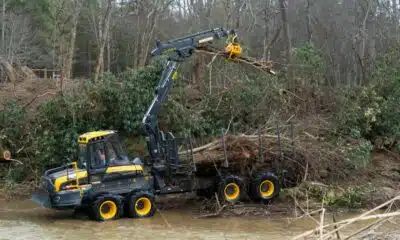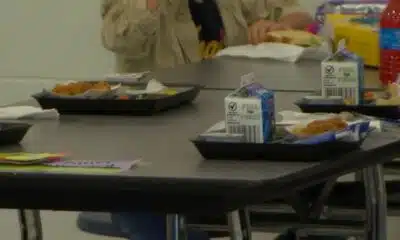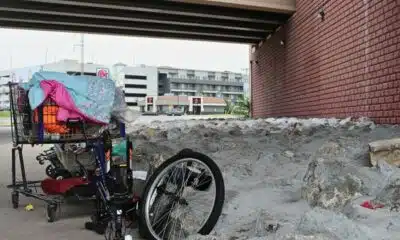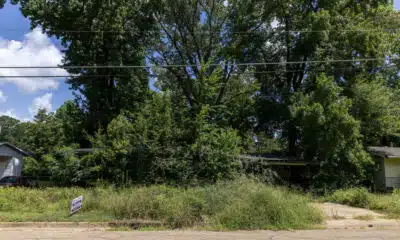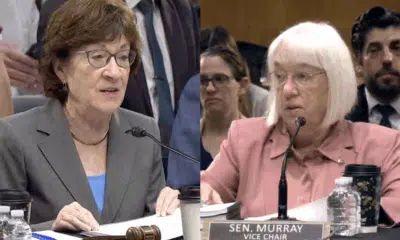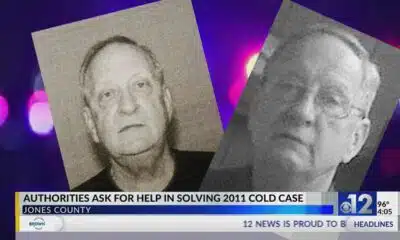News from the South - West Virginia News Feed
Two fatalities confirmed in weekend flooding in WV; Morrisey gives update on recovery efforts
Two fatalities confirmed in weekend flooding in WV; Morrisey gives update on recovery efforts
by Caity Coyne, West Virginia Watch
February 18, 2025
At least two people have now died due to flooding in West Virginia’s southern coalfields, where already struggling communities were washed out in a torrent of rain that hit over the weekend.
The two victims, Debbie and Donald Griffin, were from Welch. Gov. Patrick Morrisey said at least one other person is still missing in McDowell County, where search and rescue teams were active Tuesday.
Morrisey said he spent Monday surveying damage across the coalfields, with specific stops in Mingo and McDowell counties.
“I first met some people who seemed to have lost everything …,” Morrisey said. “I want to send a message that the state is looking to do everything possible through its efforts and its resources to be helpful.”
As a state, the governor said agencies have taken on a “unified response” in both cleaning up debris left by the flood waters and coordinating response efforts for those who need assistance.
Five liaison officer teams from the West Virginia National Guard were working throughout the region while local and state emergency responders were combining efforts. Members of the West Virginia State Police, the state fire marshal’s office and those with corrections were operating drones to survey damage from above and help concentrate recovery efforts in places that needed it most. Workers from the state Department of Transportation, the Division of Natural Resources and the Department of Environmental Protection, among others, were also on the ground.
Morrisey said a bright spot in the ongoing devastation across the coalfields was how West Virginians — and those from outside the state — have stepped up to help their community through donations and cleanup efforts. He said bottled water had been donated from multiple residents who were spared from the floods. Other donations came in from as far away as Texas.
“I saw so much volunteer efforts and food and water and people that cared so much. That’s the West Virginia way,” Morrisey said. “… We thank everyone who is putting themselves in harm’s [way] to save the lives of their neighbors. There’s no substitute for that — people acting selflessly to help their fellow West Virginians.”
Boil water advisories so far have been issued for residents served by public service districts in Williamson, McDowell, Kermit, Mingo and Crum. Those who rely on those systems for water should abstain from drinking anything coming out of their taps until further notice.
Water service in general was still out completely for portions of both McDowell and Mingo counties, Morrisey said. Utility operators, he continued, were working to flush lines and restore service as soon as possible on Tuesday.
In addition to the water outages, power remained out for more than 8,000 West Virginians on Tuesday, Morrisey said. Utility workers and others had restored power to nearly 56,000 residents on Tuesday. In some areas, responders were needing to wait until flood waters receded and debris was cleared out before repairing power lines.
Flood waters can be breeding grounds for disease due to contaminants that could enter the body through open wounds, among other ways. There can also be dangers — loose metal, sharp objects and more — hidden in flood waters, which can be hazardous for people caught in them. Morrisey said 250 tetanus shots were sent this week to Williamson Memorial Hospital and to Wyoming County for anyone who may have been exposed in the overflowing waters.
At least four school districts — in Mingo, McDowell, Raleigh and Wyoming counties — had closures on Tuesday for either power outages, road closures or damage from floods. In several of those counties, schools were being used as shelters or distribution centers for people displaced by the floods and in need of supplies. Social media postings from Mingo and McDowell on Sunday said both districts would be closed “until further notice,” however no announcements regarding any closures were posted on the state Department of Education’s website as of 4 p.m.
GET THE MORNING HEADLINES.
West Virginia Watch is part of States Newsroom, a nonprofit news network supported by grants and a coalition of donors as a 501c(3) public charity. West Virginia Watch maintains editorial independence. Contact Editor Leann Ray for questions: info@westvirginiawatch.com.
The post Two fatalities confirmed in weekend flooding in WV; Morrisey gives update on recovery efforts appeared first on westvirginiawatch.com
News from the South - West Virginia News Feed
Historically redlined communities have slower EMS response times
by Nada Hassanein, West Virginia Watch
August 5, 2025
Residents of historically redlined communities experience slower response times from emergency medical services, according to a study published Tuesday in JAMA Network Open.
Redlining refers to the discriminatory practice under which the federal government and banks systematically denied mortgages to Black and Hispanic residents. The practice deemed neighborhoods with higher proportions of nonwhite residents to be undesirable and financially risky for mortgage lending.
Researchers mapped locations of EMS centers across 236 cities and analyzed maps produced in the 1930s by the Home Owners’ Loan Corporation. The government agency, created as part of the New Deal, consistently ranked majority-Black areas as “hazardous” for lending. Redlining has been illegal since enactment of the federal Fair Housing Act in 1968.
The research team calculated average EMS response times using the location of ambulance, fire and rescue services and historical traffic data. “Rapid” response was defined as five minutes or less, the benchmark set by the National Fire Protection Association for high-priority patients with life-threatening conditions.
The team found that more than 2.2 million people lack rapid EMS access. Areas historically graded “D” — financially “hazardous” for mortgage lending — had a significantly higher proportion of residents (roughly 7%) without rapid EMS access, compared with about 4% of residents in historically “most desirable” A-graded neighborhoods. D-graded neighborhoods had higher proportions of Black residents, whereas A-graded neighborhoods had more white residents.
Disparities were particularly acute in the Great Lakes region, the authors note. The odds of lacking rapid access to EMS were nearly three times higher for residents in historically D-graded neighborhoods, compared with A-graded neighborhoods in that region.
The findings add to the evidence linking policies rooted in structural racism to health disparities.
Research has shown redlined neighborhoods still disproportionately grapple with a multitude of health disparities, lower life expectancy and more exposure to air pollution.
The study found a racial disparity in where EMS stations are located, with fewer EMS stations in urban communities of color. Better tracking and accountability of EMS response times in communities could help address the issue, the researchers wrote.
Delays in emergency care are associated with higher mortality rates. For traumatic injuries, timely care is critical during what EMS professionals call the “golden hour,” or the first 60 minutes after an injury.
Other research has pointed to disparities in emergency response times. EMS response times for patients with cardiac arrest, for example, were 10% longer for low-income ZIP codes than high-income ZIP codes, according to a national study published in JAMA Network Open in 2018.
The study received funding support from the National Institutes of Health’s National Institute of Minority Health and Health Disparities.
Stateline reporter Nada Hassanein can be reached at nhassanein@stateline.org.
West Virginia Watch is part of States Newsroom, a nonprofit news network supported by grants and a coalition of donors as a 501c(3) public charity. West Virginia Watch maintains editorial independence. Contact Editor Leann Ray for questions: info@westvirginiawatch.com.
The post Historically redlined communities have slower EMS response times appeared first on westvirginiawatch.com
Note: The following A.I. based commentary is not part of the original article, reproduced above, but is offered in the hopes that it will promote greater media literacy and critical thinking, by making any potential bias more visible to the reader –Staff Editor.
Political Bias Rating: Center-Left
This content presents a fact-based exploration of how historical redlining—an explicitly racial and economic discriminatory practice—continues to impact disparities in emergency medical service response times. It highlights systemic inequalities and racial disparities consistent with social justice concerns more frequently emphasized in center-left discourse. The piece supports the view that structural racism has long-term effects and implicitly advocates for policy attention and accountability in emergency services, aligning with a center-left perspective on addressing inequality and promoting equity in public services. However, it maintains a measured tone and relies heavily on research and data, avoiding overt partisan rhetoric.
News from the South - West Virginia News Feed
Boone St. crossing unsafe to walk across
SUMMARY: A coal train with 220 cars, weighing 54 million pounds, derailed late Saturday night in Saint Albans. Due to the derailment, the police department warns that the crossing at the Boone Street tunnel is unsafe for pedestrians. CSX, the railroad company, states that track repair equipment will be moved periodically through the area, further increasing the hazard. Residents are strongly advised not to walk across the Boone Street crossing until repairs are completed and it is deemed safe. Authorities continue monitoring the situation to ensure public safety during the ongoing repair work.
Boone St. crossing unsafe to walk across
For more Local News from WSAZ: https://www.wsaz.com/
For more YouTube Content: https://www.youtube.com/channel/UCrcuU0JXXy8oIBqEB13mrwA
News from the South - West Virginia News Feed
Christian's Morning Forecast: A Nice Start Before More Showers
SUMMARY: Storm Watch meteorologist Christian Butler reports a mild start with temperatures in Bluefield reaching the mid-70s before cooling overnight. Currently, some fog affects Greenbryer, Nicholas, and Monroe counties, urging cautious driving. A stationary front over Florida will bring moisture northward, causing showers and storms starting tomorrow. High pressure today limits rain, but it retreats by Wednesday, the week’s rainiest day. Showers continue scattered through the weekend, with Saturday slightly clearer. Temperatures will remain above average for the next 6 to 10 days across the central and eastern U.S., paired with increased precipitation. Expect a mix of showers and storms through the extended forecast.
FOLLOW US ON FACEBOOK AND TWITTER:
https://facebook.com/WOAYNewsWatch
https://twitter.com/WOAYNewsWatch
-
News from the South - Texas News Feed6 days ago
Rural Texas uses THC for health and economy
-
Mississippi Today3 days ago
After 30 years in prison, Mississippi woman dies from cancer she says was preventable
-
News from the South - Alabama News Feed7 days ago
Decision to unfreeze migrant education money comes too late for some kids
-
News from the South - Georgia News Feed4 days ago
Woman charged after boy in state’s custody dies in hot car
-
Mississippi Today7 days ago
They own the house. Why won’t they cut the grass?
-
News from the South - Arkansas News Feed7 days ago
Trump’s big proposed cuts to health and education spending rebuffed by US Senate panel
-
News from the South - Georgia News Feed6 days ago
Delta jet makes emergency landing | FOX 5 News
-
Mississippi News Video7 days ago
Jones County investigators work to solve 2011 cold case

